
Journal Menu
► ▼ Journal Menu-
- Materials Home
- Aims & Scope
- Editorial Board
- Reviewer Board
- Topical Advisory Panel
- Instructions for Authors
- Special Issues
- Topics
- Sections & Collections
- Article Processing Charge
- Indexing & Archiving
- Editor’s Choice Articles
- Most Cited & Viewed
- Journal Statistics
- Journal History
- Journal Awards
- Society Collaborations
- Conferences
- Editorial Office
Journal Browser
► ▼ Journal BrowserNeed Help?
Announcements
4 December 2024
685 MDPI Editors Named Highly Cited Researchers in 2024

We extend our heartfelt congratulations to the 685 Editorial Board Members of our journals – from 39 different countries and territories – who have been recognized as Highly Cited Researchers for 2024 by Clarivate. This distinction highlights their exceptional scientific achievements and significant contributions, which transcend academic boundaries to advance global knowledge, sustainability, security, and well-being.
Clarivate's annual Highly Cited Researcher™ list identifies the most influential scientists of the past decade, whose work has had a profound and widespread impact across various scientific and social science disciplines. Their impactful papers rank among the top 1% by citations in one or more of the 21 fields analyzed within the "Essential Science Indicators," marking them as leaders in their respective domains.
"Highly Cited Researchers have demonstrated significant and broad influence in their field(s) of research," according to Clarivate. In 2024, a total of 6,886 Highly Cited Researcher designations were awarded to 6,636 individuals.
The following is a list of MDPI's Editorial Board Members named Highly Cited Researchers in 2024. We congratulate them for their achievement and their contributions to advancing knowledge in their respective fields.
|
Abate, Antonio |
Jiang, Lianzhou |
Song, Jibin |
29 November 2024
Materials | Highly Cited Papers in 2024

We are pleased to announce that we have selected five highly cited papers, according to the Web of Science, from articles published in 2024. You are welcome to read them!
1. “Biomedical Applications of Titanium Alloys: A Comprehensive Review”
by Elia Marin and Alex Lanzutti
Materials 2024, 17(1), 114; https://doi.org/10.3390/ma17010114
Available online: https://www.mdpi.com/1996-1944/17/1/114
2. “Purification of Quinoline Insolubles in Heavy Coal Tar and Preparation of Meso-Carbon Microbeads by Catalytic Polycondensation”
by Lei Zhang, Ruikang Song, Yang Jia, Zhuorui Zou, Ya Chen and Qi Wang
Materials 2024, 17(1), 143; https://doi.org/10.3390/ma17010143
Available online: https://www.mdpi.com/1996-1944/17/1/143
3. “Dynamic Splitting Performance and Energy Dissipation of Fiber-Reinforced Concrete under Impact Loading”
by Dashun Cui, Limin Wang, Chunwei Zhang, Huiting Xue, Dianwei Gao and Fanxiu Chen
Materials 2024, 17(2), 421; https://doi.org/10.3390/ma17020421
Available online: https://www.mdpi.com/1996-1944/17/2/421
4. “Biomaterials for Drug Delivery and Human Applications”
by Paolo Trucillo
Materials 2024, 17(2), 456; https://doi.org/10.3390/ma17020456
Available online: https://www.mdpi.com/1996-1944/17/2/456
5. “Current Trends in Metallic Materials for Body Panels and Structural Members Used in the Automotive Industry”
by Tomasz Trzepieciński and Sherwan Mohammed Najm
Materials 2024, 17(3), 590; https://doi.org/10.3390/ma17030590
Available online: https://www.mdpi.com/1996-1944/17/3/590
29 November 2024
Recruiting Guest Editors for Materials

Materials (ISSN: 1996-1944, IF 3.1) is an international peer-reviewed, open access journal on materials science and engineering published semimonthly online by MDPI. The journal covers all aspects of materials science and engineering, including synthesis, structure, mechanical, chemical, electronic, magnetic, and optical properties, as well as their various applications. More information about the journal is available through the following link: https://www.mdpi.com/journal/materials.
We are currently recruiting Guest Editors for this journal. If you are an active researcher in the field and passionate about publishing cutting-edge research, please do not hesitate to contact us at materials@mdpi.com.
The responsibilities of Guest Editors include the following:
- Defining the aims and scopes of Special Issues;
- Carrying out pre-checks and making final decisions as to whether a paper is acceptable (according to the review reports);
- Providing potential author lists and inviting high-quality contributions.
The benefits of being a Guest Editor include the following:
- A certificate in recognition of your role as a Guest Editor of Materials;
- Consideration as a Materials Editorial Board Member candidate if a Special Issue is successful;
- Special Issue Reprints: MDPI provides the opportunity for authors to have the Special Issue reprinted in book format. Reprints will be available through our various channel partners. If a Special Issue publishes more than 10 papers (excluding editorials), it may be published as a reprinted Special Issue book with an ISBN, and each Guest Editor will receive a hard copy free of charge;
- The opportunity to participate in or host academic meetings or online seminars related to the Guest Editors' research focus.
It is our pleasure to receive applications from leading experts in the aforementioned academic fields. We welcome and encourage you to apply.
You can submit your application directly via the following link: https://www.mdpi.com/journalproposal/sendproposalspecialissue/materials.
If you have any questions before or after applying, please do not hesitate to contact us at materials@mdpi.com.
Materials Editorial Office
25 November 2024
The 5th International Conference on Symmetry (Symmetry 2025)—Open for Submissions

We are pleased to announce that the 5th International Conference on Symmetry (Symmetry 2025) is scheduled to take place from 16 to 19 May 2025 in Hangzhou, China. The conference, organized by MDPI’s Symmetry (ISSN: 2073-8994, Impact Factor: 2.2), aims to gather researchers, professionals, and experts interested in this field to share their latest research findings, innovations, and experiences.
For this upcoming event, we are proud to announce the following conference chairs and plenary speakers.
Conference Chairs:
- Dr. Sergei D. Odintsov, Institute of Space Sciences, Spain;
- Dr. Changzheng Qu, Ningbo University, China;
- Dr. Jihuan He, Soochow University, China.
Plenary Speakers:
- Dr. Ronggen Cai, Ningbo University, China;
- Dr. Sergei D. Odintsov, Institute of Space Sciences, Spain;
- Dr. Jiping Zhang, Peking University, China.
Topics of Interest and Session Chairs:
S1. Physics
- Session Chair: Shin'ichi Nojiri, Nagoya University, Japan;
- Session Chair: Prof. Tianjun Li, Chinese Academy of Sciences; Henan Normal University, China;
- Session Chair: Prof. Yuxiao Liu, Lanzhou University, China.
S2. Mathematics
- Session Chair: Prof. Qingwen Wang, Shanghai University, China;
- Session Chair: Prof. Shoufeng Shen, Zhejiang University of Technology, China.
S3. Chemistry
- Session Chair: György Keglevich, Budapest University of Technology and Economics, Hungary;
- Session Chair: Prof. Weihua Tang, Xiamen University, China.
S4. Engineering
- Session Chair: Prof. Chong Wang, Beihang University China, China;
- Session Chair: Prof. Deming Lei, Wuhan University of Technology, China.
S5. Computer Science
- Session Chair: Prof. Hu Xiong, University of Electronic Science and Technology of China, China;
- Session Chair: Prof. Kuo-Hui Yeh, National Yang Ming Chiao Tung University, Taiwan.
S6. Symmetry Applications
- Session Chair: Prof. Jihuan He, Soochow University, China;
- Session Chair: Prof. Chunli Zhang, Zhejiang University, China.
Conference Awards:
- Best Oral Presentation Award;
- Best Poster Award;
- Best Speaker Award.
Number of winners: 23.
Prizes:
CNY 1500 (5 winners); a full Article Processing Charge (APC) waiver for Symmetry (6 winners); a 50% APC waiver for Symmetry (12 winners); and a certificate celebrating this achievement (all winners).
Guide for Authors:
To submit your abstract, please click on the following link:
https://sciforum.net/user/submission/create/1219.
To register for the event, please click on the following link:
https://sciforum.net/event/symmetry2025?section=#registration.
For more information, you may refer to the following:
https://sciforum.net/event/symmetry2025?section=#instructions.
Important Dates:
Abstract Submission Deadline: 16 February 2025
Notification of Acceptance: 9 March 2025
Early-Bird Registration: 16 March 2025
Registration Deadline: 16 May 2025
We look forward to receiving your contribution to Symmetry 2025.
Conference Chairs
Symmetry 2025 Organizing Team (symmetry2025@mdpi.com)
22 November 2024
Meet Us at the 10th International Workshop on Advanced Materials, 20–22 December 2024, Shenzhen, China

The 10th International Workshop on Advanced Materials will be held from 20 to 22 December 2024 in Shenzhen, China. The conference will be hosted by the Harbin Institute of Technology (Shenzhen) and the Chinese Phase Diagram Committee of the Chinese Physical Society.
The areas of focus for the conference include the following:
- Advanced intermetallic compounds and metallic materials, including material preparation, composite materials, physical properties, deformation and fracture, environmental brittleness, functional properties, theoretical modeling and industrial applications;
- High-entropy material, including materials and process development, high temperature- and radiation-resistant materials, coatings and films, physical metallurgy and solid-state physics, material properties, structure and characterization, material simulation and application, etc.
The following MDPI journals will be represented at the conference:
If you are planning to attend the above conference, please feel free to start an online conversation with us. Our delegates look forward to meeting you in person and answering any questions that you may have.
19 November 2024
Meet Us at the 2024 Second Conference on Data-Driven High Entropy and Amorphous Materials, 13–15 December 2024, Fuzhou, China

Conference: 2024 Second Conference on Data-Driven High Entropy and Amorphous Materials
Date: 13–15 December 2024
Location: Fuzhou, China
MDPI will be attending the 2024 Second Conference on Data-Driven High Entropy and Amorphous Materials as an exhibitor, and we are welcoming researchers from different backgrounds to visit and share their latest ideas with us.
The 2024 Second Conference on Data-Driven High Entropy and Amorphous Materials is jointly organized by multiple entities, including the Chinese Materials Research Society, the Fuyao University of Science and Technology, the University of Science and Technology Beijing, and others. The conference aims to explore the performance and characteristics of materials under extreme conditions and in service environments, as well as the pivotal challenges and research directions involved in their development. It serves as a platform for experts, scholars, engineers, technical researchers, and enterprises in the fields of materials science and engineering to share scientific achievements and cutting-edge technologies, as well as to facilitate industrialization cooperation of academic research.
The following MDPI journals will be represented at the conference:
If you are planning to attend the above conference, please do not hesitate to start a conversation with us. Our delegates look forward to meeting you in person and answering any questions that you may have. We welcome researchers from different backgrounds to visit and share their latest ideas with us.
For more information about the conference, please visit the following website: https://www.sciencer.cn/productinfo/1247297.html.
13 November 2024
Meet Us at the 4th Central European Technology Forum, 18–19 November 2024, Krakow, Poland
MDPI will be attending the 4th Central European Technology Forum, which will be held from 18 to 19 November 2024 in Krakow, Poland.
This year’s edition of the Forum will be organized by IZTECH, AGH University of Krakow, Jagiellonian University in Krakow, City of Krakow, and the Polish Federation of Engineering Associations.
The Forum will be an ideal opportunity for stakeholders representing 16 countries in Central Europe to discuss and share novel findings and build partnerships that will shape the European technology and industry of tomorrow. The Forum is also expected to put forward some new ideas and proposals aimed at implementing the European technological and scientific agenda for 2025–2030.
The following MDPI journals will be represented at the symposium:
- World;
- Energies;
- Sustainability;
- Materials;
- AI;
- Applied Sciences;
- BDCC;
- Aerospace;
- Technologies;
- Machines;
- Foods;
- JETA.
If you are planning to attend the above-mentioned conference, we encourage you to visit our booth and speak with our representatives. We are eager to meet you in person and assist you with any queries that you may have.
For more information about the conference, please visit the official website: https://cetef.eu/en/main/
11 November 2024
Meet Us at the 34th Annual Meeting of MRS-J, 16–18 December 2024, Yokohama, Japan

The 34th Annual Meeting of MRS-J will be held from 16 to 18 December 2024 in Yokohama, Japan. The conference will be hosted by the Materials Research Society of Japan.
The areas of focus for the conference include the following:
- Fundamentals for materials and data science;
- Nanomaterial science and technology;
- Soft materials and bioscience;
- Advanced functional materials;
- Society and the environment;
- Material innovation for the circular economy.
The following MDPI journals will be represented at the conference:
- Materials;
- Batteries;
- Inorganics;
- Coatings.
If you are planning to attend the above conference, please feel free to start an online conversation with us. Our delegates also look forward to meeting you in person and answering any questions that you may have. For more information about the conference, please visit the following link: https://www.mrs-j.org/meeting2024/en/.
5 November 2024
MDPI INSIGHTS: The CEO's Letter #17 - OA Week, Basel Open Day, Beijing Graphene Forum

Welcome to the MDPI Insights: The CEO's Letter.
In these monthly letters, I will showcase two key aspects of our work at MDPI: our commitment to empowering researchers and our determination to facilitating open scientific exchange.
Opening Thoughts

Open Access Week: Forging the Future of Open Access through Global Reach and Collaboration
From 21 to 27 October, we celebrated International Open Access Week (OAW), highlighting the importance of making research accessible to everyone. This campaign reinforced our commitment to advancing open access (OA) and showcased how we are helping research communities worldwide adopt OA as their standard.
“OA publishing is now a cornerstone of global research”
Throughout the week, we featured MDPI’s efforts to support quality open research through blog posts on topics such as how Research Integrity Promotes OA Practices, our Preprints.org platform, and supporting societies with different OA models. These initiatives capture our commitment to making research more inclusive and accessible to all.
OA publishing is now a cornerstone of global research, with more researchers choosing OA over traditional paywalled models, and embracing new, community-driven models.
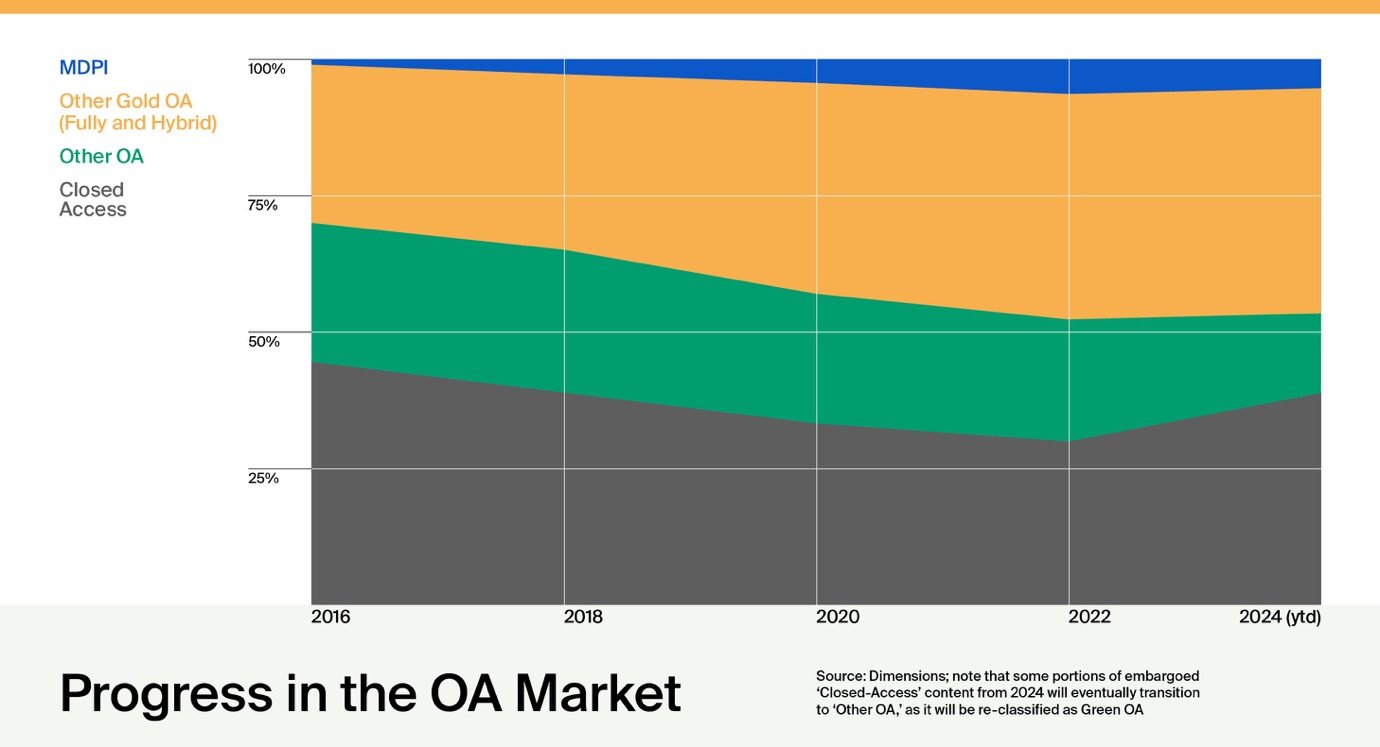
Benefits of Open Access and Open Research
- Accelerated Discoveries: OA speeds up scientific progress by allowing immediate access to findings, enabling researchers to build on each other’s work faster.
- Community-Led Innovation: Open research empowers communities to manage their own platforms, creating collaboration and shared knowledge.
- Increased Visibility: OA broadens the reach of your research, leading to greater recognition, collaboration, and impact.
- Cross-Disciplinary Connections: By removing financial and geographical barriers, OA unites diverse fields, sparking innovation across disciplines.

MDPI Singapore Celebrates Open Access Week
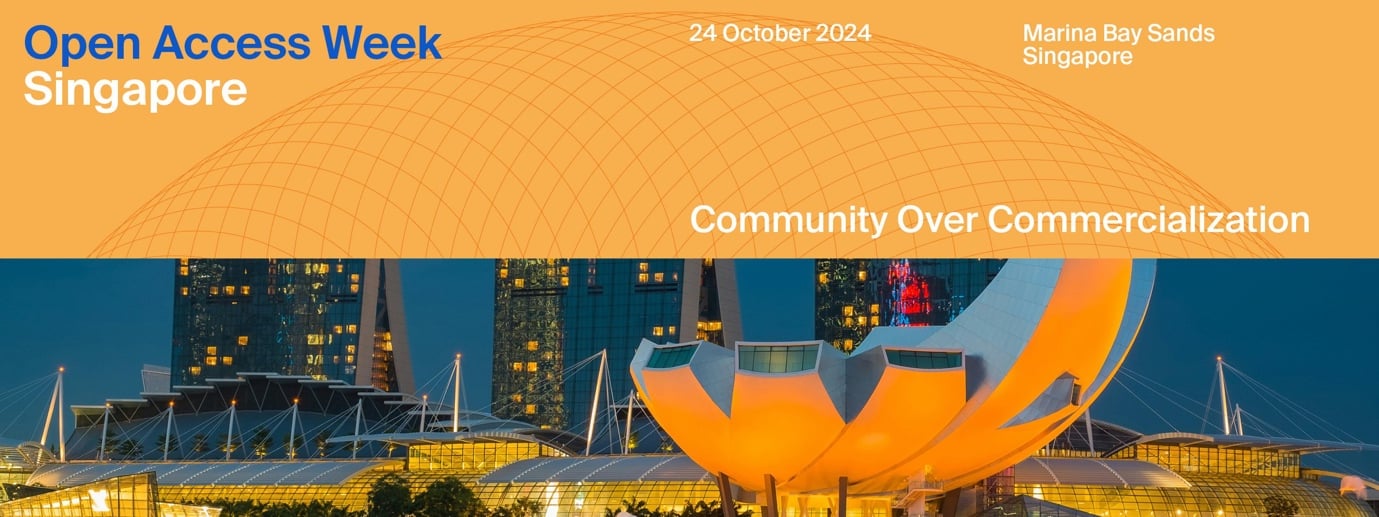
MDPI Singapore also hosted its first-ever OAW event at the Marina Bay Sands Convention Centre, bringing together academics, researchers, and students to discuss the future of open scholarship. Conversations focused on the potential of new publishing models, alternative funding strategies, and the importance of communicating research to wider audiences.
As OA evolves, MDPI remains a committed partner in advancing open science and creating a transparent, inclusive research environment. For a full recap of the week’s highlights and resources, visit our campaign page.

Impactful Research
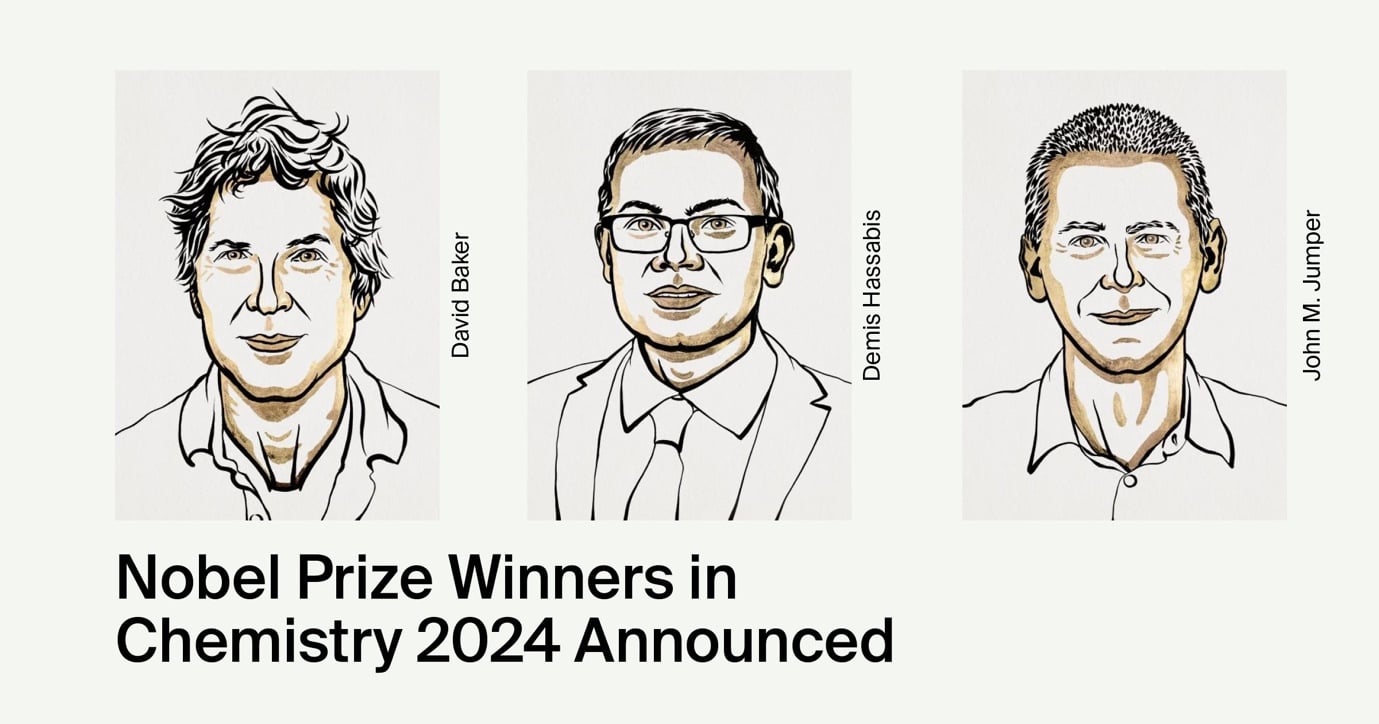
MDPI Connection to Nobel-Winning Protein Research
David Baker, an American biochemist, and Demis Hassabis and John M. Jumper, two scientists from Google DeepMind, have been awarded the 2024 Nobel Prize in Chemistry for their groundbreaking advancements in better understanding the structure of proteins, the molecular engines of life’s processes.
One half of the prize was awarded to Professor David Baker from the University of Washington for his development of revolutionary protein design software enabling the creation of novel proteins for vaccines, nanomaterials, and sensors. Prof. Baker co-authored a 2016 paper in MDPI’s Toxins journal on protein-based therapeutics.
Meanwhile, DeepMind’s Demis Hassabis and John M. Jumper received recognition for AlphaFold, the AI model that predicts protein structures from amino acid sequences, fulfilling a long-held scientific dream.
“We congratulate this year’s Nobel laureates for their groundbreaking contributions to the study of life”
Nobel Prize Laureates Entrust MDPI with Their Research
As at October 2024, 45 Nobel laureates had contributed to more than 115 articles across
35 MDPI journals. The privilege of hosting the research of such contributors, who significantly influence the open access movement, resonates deeply with our editorial teams.
We are proud to list the names of Pierre Agostini, Hiroshi Amano, Werner Arber, Aaron Ciechanover, Robert H. Grubbs, Oliver Hart, Gerard ‘t Hooft, Michael Houghton, Harald zur Hausen, Katalin Karikó, Jean-Marie Lehn, Gérard Mourou, Ferid Murad, Shuji Nakamura, William Nordhaus, Kostya S. Novoselov, Giorgio Parisi, Charles M. Rice, Alvin E. Roth, Donna Strickland, K. Barry Sharpless, George F. Smoot, Anne L’Huillier, Drew Weissman, Kurt Wüthrich, Ada Yonath, Tomas Lindahl, Thomas C. Südhof, Stanley B. Prusiner, Roger Kornberg, Robert F. Engle, Richard J. Roberts, Ōmura Satoshi, Kenneth J. Arrow, John B. Goodenough, Jennifer Doudna, Hamilton Othanel Smith, Eric R. Kandel, Carlo Rubbia, Bernard Feringa, Barry J. Marshall, Anthony J. Leggett, Andrew Victor Schally, and David Baker.
Notable MRNA Published in Cells
On 7 October 2024, the 2024 Nobel Prize in Physiology or Medicine was jointly awarded to Victor Ambros and Gary Ruvkun for the discovery of microRNA and its role in post-transcriptional gene regulation.
MicroRNAs are proving to be fundamentally important for how organisms develop and function. Some interesting papers about microRNA research are published in the MDPI journal Cells. I invite you browse through the notable papers related to microRNA research in Cells.
Inside MDPI
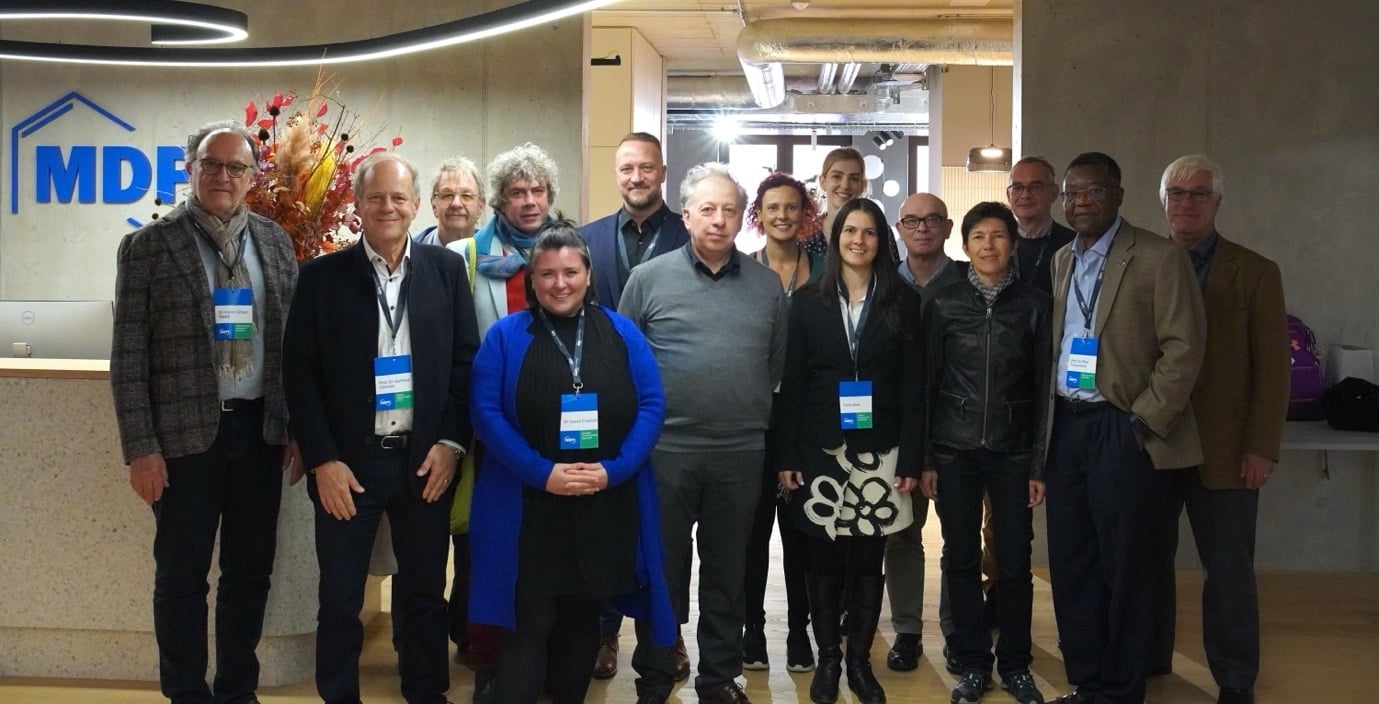
Basel Open Day
On 21 October, we held the Basel Open Day at our headquarters, welcoming a group of journal Editors-in-Chief (EiC) and Editorial Board Members (EBMs) for a full-day workshop. The event featured presentations and discussions on MDPI’s latest editorial updates, data integrity policies, society collaborations, and local market insights.
The following MDPI journals were represented during the visit: Physics, Journal of Personalized Medicine (JPM), Sci, Remote Sensing, Animals, Cells, Buildings, Histories, Sensors, and International Journal of Environmental Research and Public Health (IJERPH).
This was a great opportunity to showcase our new office space while gathering feedback from leading journal stakeholders. To get everyone on the same page, we took 60 minutes for round-table introductions, which helped set a collaborative tone and ground us in MDPI’s mission of disseminating open science.
“This was a great opportunity to gather feedback from leading journal stakeholders”
The general feedback from the day highlighted positive developments around our editorial and ethics policies, as well as areas for improvement, including flexibility regarding reviewer deadlines. There was a genuine appreciation and push for our ongoing efforts to share more about MDPI, including company updates and promoting high-quality research through our blog, announcements, and social media channels, which we have been growing and expanding.
Our Basel Open Day was a positive experience, bringing together key journal stakeholders and gathering insights to guide MDPI’s continued engagement with the academic community. We look forward to hosting future events of this kind and welcoming more scholars to our headquarters in Basel, Switzerland.
Coming Together for Science

ncRNA 2024 Conference in Basel
I am pleased to share that we held Non-coding RNA World 2024: Exploring Mechanisms, Designing Medicines (ICM 2024) in Basel, Switzerland this past 7–9 October.
The three-day event attracted just over 100 attendees, including two Chairs, 10 invited speakers and two keynotes from Prof. Mauro Giacca and Prof. Ling-Ling Chen. Of the presentations on site, there were 35 posters and 44 oral presentations.
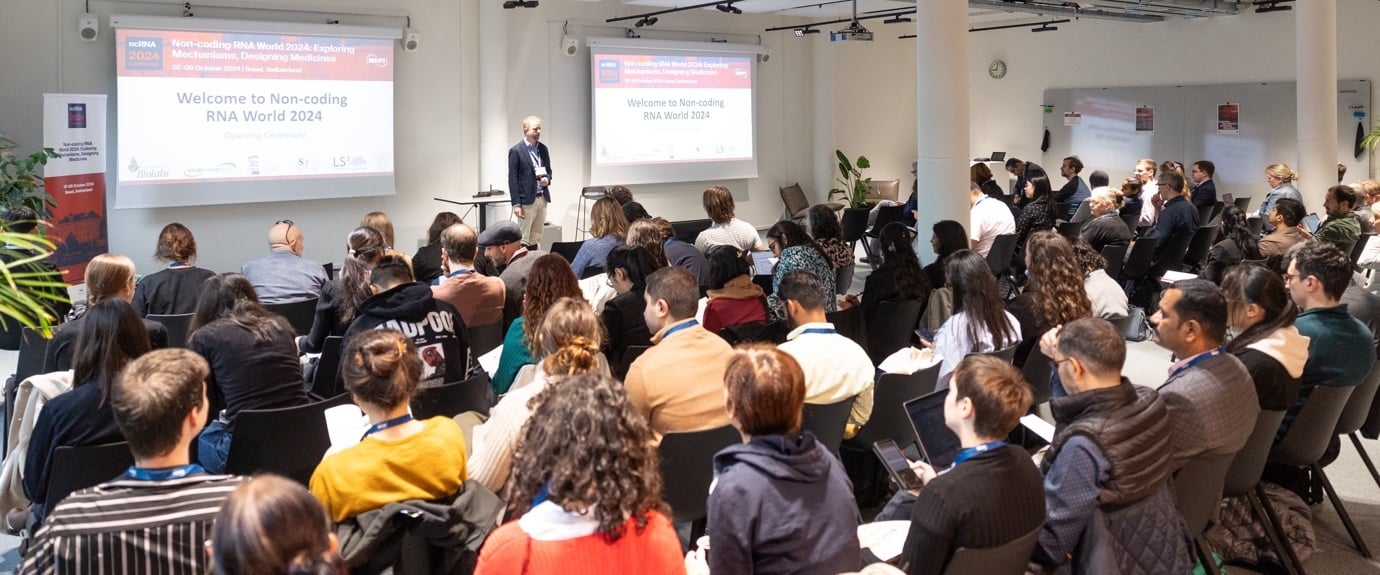
The overall feedback was positive, with people enjoying the intimate event and the unique activities offered, including a guided tour around Basel’s Old Town (a must-see for anyone visiting the city) and a memorable conference dinner.

It was cool to see the winners of the 2024 Nobel Prize in Physiology or Medicine announced during the conference days. This was exciting for attendees, as the winners discovered a new class of RNA molecules (miRNAs). As one invited speaker put it, “It's exciting to be among fellows when something that important for the field is announced.”
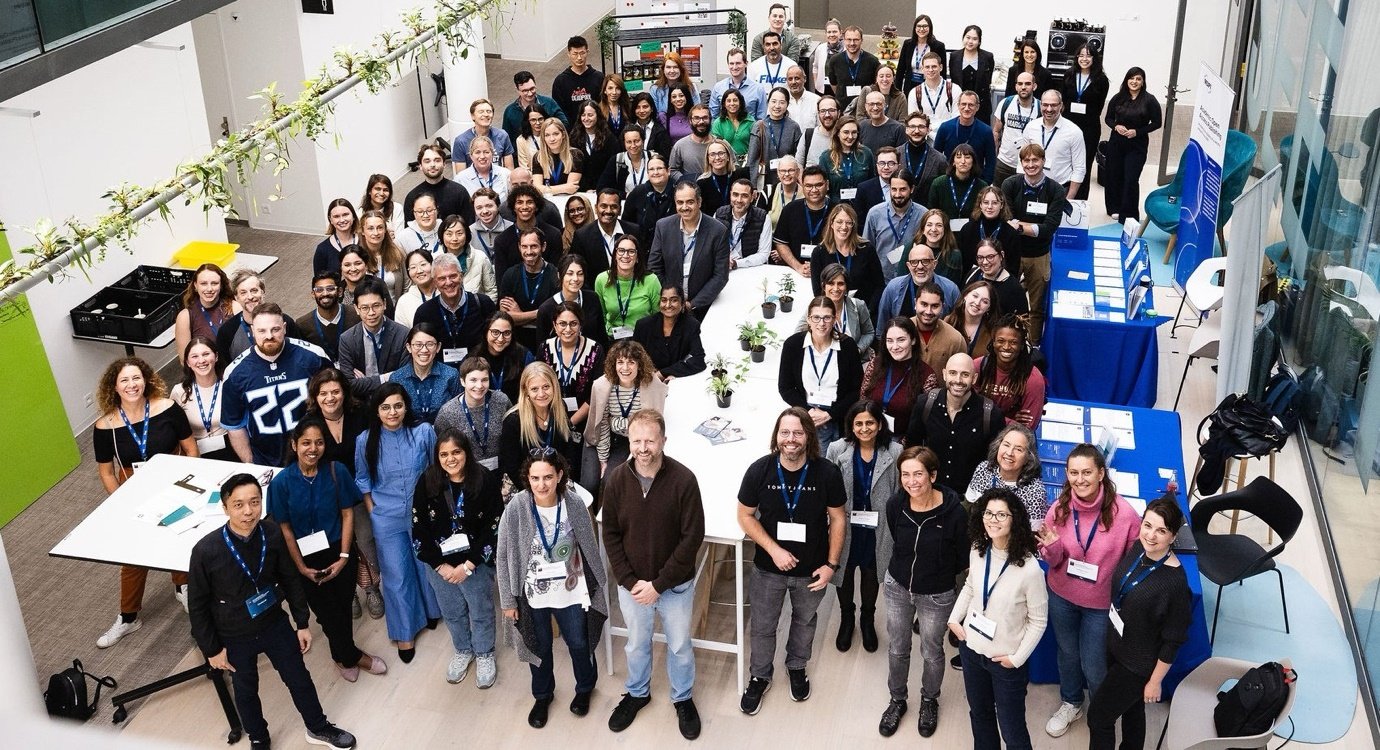
“It's exciting to be among fellows when something that important for the field is announced”
Every attendee receives a conference survey, and I’m always pleased to see a high percentage of ‘Very Satisfied’ responses when asked about ‘treatment from conference personnel’. Kudos to our conference team for meeting our attendees’ needs. These events are a great opportunity for us to reach new audiences, as 92% of the respondents had never been to an MDPI conference, so I am thrilled to see us connecting with a new demographic of your researchers in the RNA field.
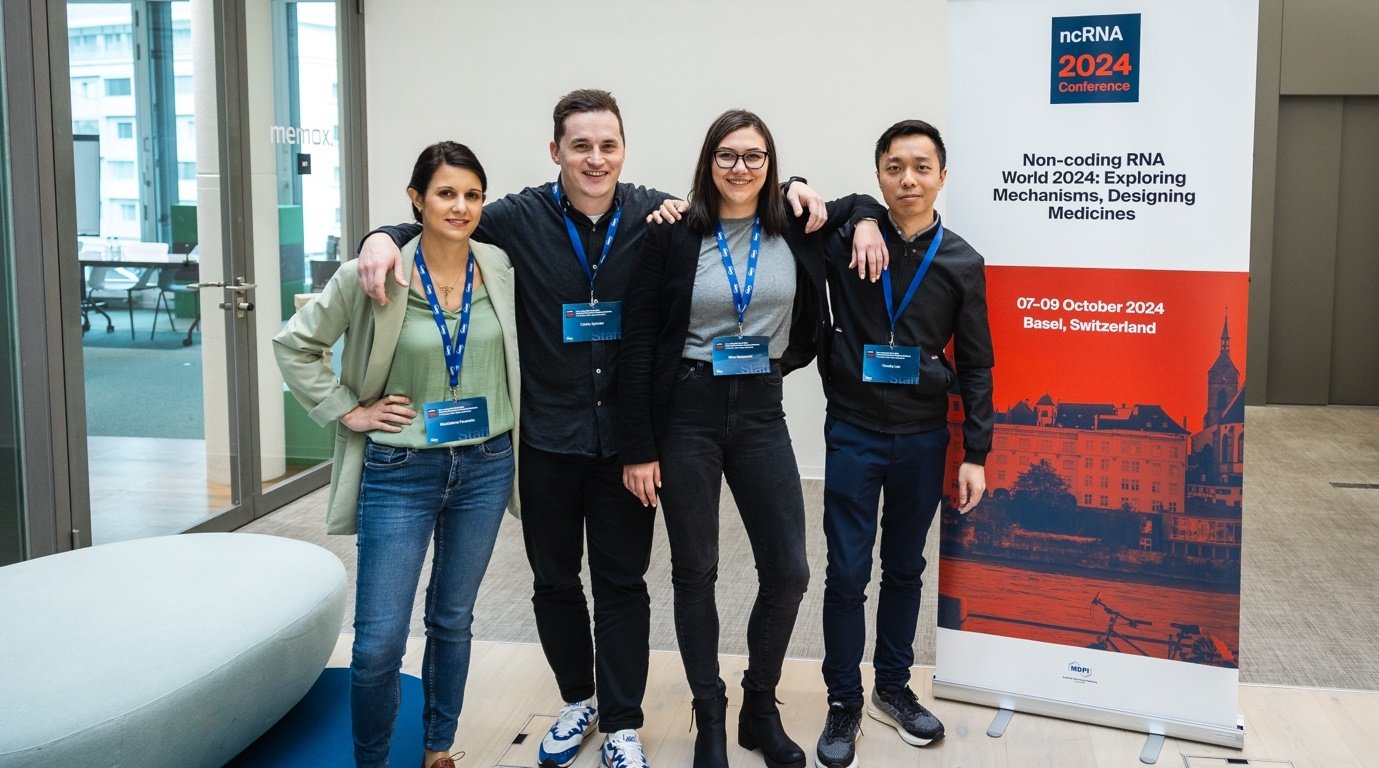
A special thank-you to our partnering societies The Epigenetics Society, The French Society of Genetics, LS2 / USGEB (Union of Swiss Societies for Experimental Biology), and The RNA Biology Group, as well as to our sponsors New England Biolabs and Arraystar for their support of the ncRNA 2024 conference. I am also pleased to report that we presented two awards, including the Best Presentation Award and two Best Poster Award, recognizing the contributions of our participants.
Upcoming In-Person Event
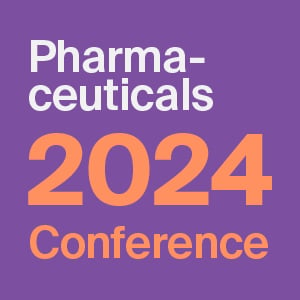
27–29 November 2024
Pharmaceuticals 2024 – Recent Advances in Pharmaceutical Sciences Towards a Healthy Life
Location: Barcelona, Spain
The discovery of new molecules, their properties, and actions to enhance human health and quality of life.
Find more upcoming MDPI events here.
Closing Thoughts
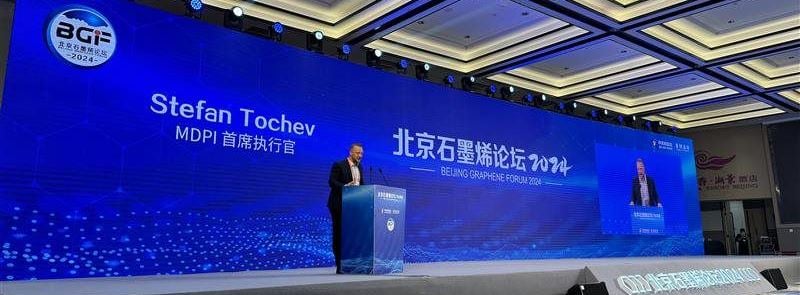
Beijing Graphene Forum 2024
I am pleased to share that we had a successful time at the Beijing Graphene Forum 2024, which drew around 1,000 attendees, including Konstantin Novoselov (2015 Nobel Prize in Physics) and other high-profile scholars in materials science and chemistry. It was a great opportunity to present MDPI on the big stage, with university presidents from institutions such as Peking University also in attendance.
I had the honour of awarding Prof. Zhongfan Liu, Chairman of the Chemical Science Committee, with a medal and presenting certificates to the members of the Chemical Science Committee; this is an important initiative to help expand MDPI’s journals and influence in China. These are highly respected scholars, and we enjoyed connecting with them over lunch as well.
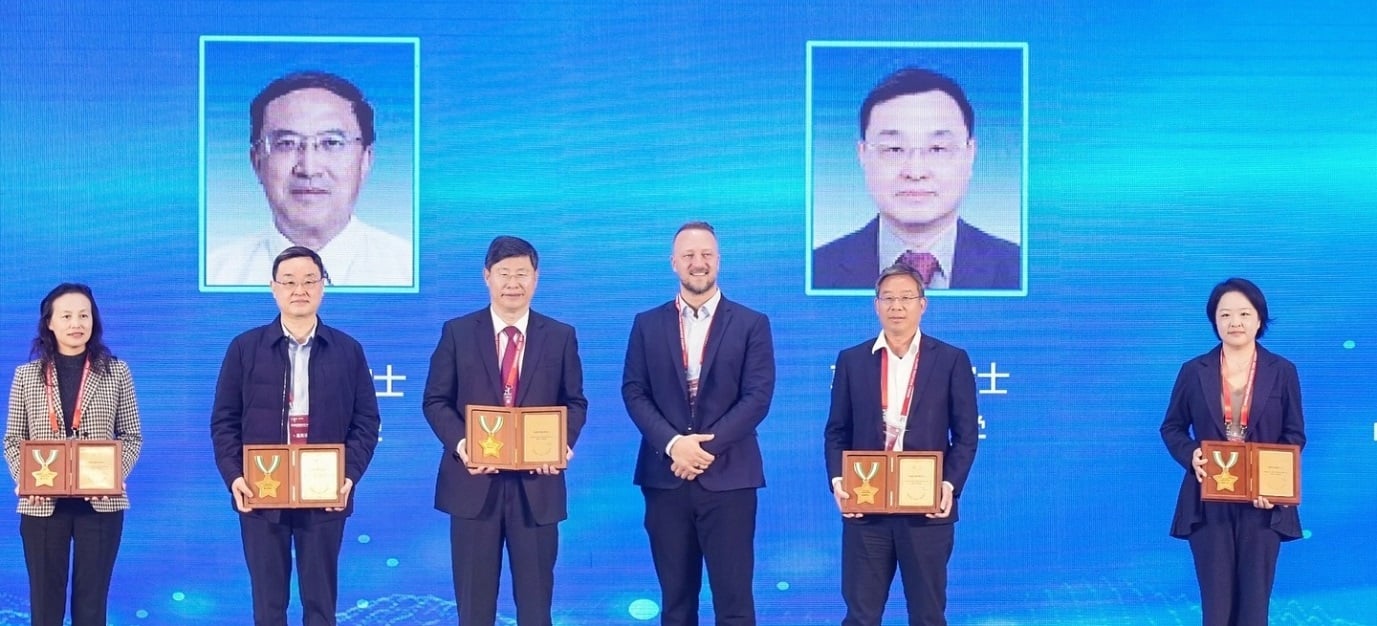
“This is an important initiative to help expand MDPI’s journals and influence in China”
I also had the chance to speak about MDPI and open access, giving a five-minute speech during the opening ceremony and a 20-minute presentation at the close. MDPI hosted a sub-forum where both academic scholars and MDPI members shared insights, and we engaged with attendees at our MDPI booth.
This was a great opportunity to spotlight MDPI as the main publishing partner for the event, and I was proud to represent us on stage. We also met with scholars to discuss topics such as their publishing needs and institutional policies, open access, impact journals, and IOAP.
Chief Executive Officer
MDPI AG
16 October 2024
MDPI's Newly Launched Journals in September 2024
Five new journals covering a diverse range of subjects launched their inaugural issue in September 2024. Like other journals in MDPI’s portfolio, these journals are dedicated to sharing the latest research through open access, reflecting our commitment to making knowledge accessible to all.
We extend our sincere gratitude to the Editorial Board Members for their dedication to the launch and development of our new journals. Each journal will ensure its high-quality output via excellent editorial and rigorous peer-review processes so that the published articles achieve significant impact and broad visibility.
We invite you to explore and learn more about these new journals below.
| Journal | Founding Editor-in-Chief | Journal Topics (Selected) |
| Prof. Dr. Nejat Düzgüneş, University of the Pacific, USA | Editorial | view inaugural issue | biological therapy and stem-cell therapy; drug therapy; chemotherapy; radiation and other nonsurgical therapeutic strategies | view journal scope | submit an article | |
| Prof. Dr. Magda Tsolaki, Greek Federation of Alzheimer’s Disease, Greece; Aristotle University of Thessaloniki, Greece | Editorial | view inaugural issue | surgical/procedural complications; complications; perioperative adverse events; postoperative adverse events | view journal scope | submit an article | |
| Prof. Dr. Steven R. Fassnacht, Colorado State University, USA; Cooperative Institute for Research in the Atmosphere, USA | Editorial | view inaugural issue | ice as a mineral; atmospheric ice; sea ice; freshwater ice; ice sheets; ice caps and ice shelves | view journal scope | submit an article | |
| Dr. Francisco Epelde, Hospital Universitari Parc Tauli, Spain; University Autonoma of Barcelona, Spain | Editorial | view inaugural issue | hospital management; hospital facilities; hospital services; hospital risk management; health law | view journal scope | submit an article | |
| Prof. Dr. Nicola Ferri, University of Padova, Italy | Editorial | view inaugural issue | lipids in cells and whole organisms; lipid structure and function; lipid products and processes; dietary lipids and nutrition | view journal scope | submit an article |
We wish to thank everyone who has supported the development of open access publishing. You are welcome to send an application here or contact the New Journal Committee (newjournal-committee@mdpi.com) if you would like to create more new journals.




